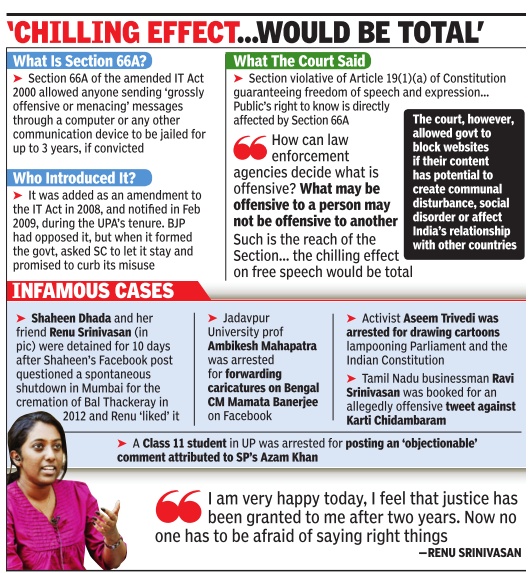Information Technology Act: India
This is a collection of articles archived for the excellence of their content. |
Sec 66A
2015: SC judgement
The Times of India Mar 25 2015
Amit Choudhury & Dhananjay Mahapatra
`Section 66A is ambiguous & prone to misuse'
The Supreme Court fortified the right to freedom of speech and liberty by striking down as unconstitutional Section 66A of the Information Technology Act, which police had used indiscriminately to arrest persons for posting criticism of government and political leaders. “Section 66A is so widely cast that virtually any opinion on any subject would be covered by it, as any serious opinion dissenting with the mores of the day would be caught within its net. Such is the reach of the section and i it is to withstand the test of constitutionality, the chilling effect on free speech would be total,“ the court said.
Justices J Chelameswar and R F Nariman said the law was ambiguously worded prone to misuse and, there fore, stretches far beyond the “reasonable restrictions“ criterion laid down under Ar ticle 19(2) of the Constitution They brushed aside the government's promise not to misuse the law, saying tha what is unconstitutiona should not be on the statute book at all. “Governments may come and governments may go but Section 66A goes on forever. An assurance from the present government even if carried out faithfully would not bind any successor government,“ the court said.
However, despite the SC judgment, citizens still need to be careful while posting comments online as provisions similar to Section 66A exist in Indian Penal Code's Sections 153 and 505. But the ruling could act as a deterrent against arrest. Referring to as many as 20 judgments of the US Supreme Court, the bench also said restriction on free speech by Section 66A, brought into force by the UPA government in 2009 by amending the I-T Act and defended in the apex court by the NDA government, far exceeded“ reasonable restrictions “provided under Article 19(2) of the Constitution. Writing a 123page judgement for the bench, Justice Nariman said: “It cannot be over emphasized that when it comes to democracy , liberty of thought and expression is a cardinal value that is of paramount significance under our constitutional scheme.“ Section 66A purports to authorize the imposi tion of restrictions on the fundamental right contained in Article 19(1)(a) (guaranteeing right to freedom of speech and expression) in language wide enough to cover restriction both within and without limits of constitutionally permissible legislative action,“ says the 123-page judgment. The court also struck down Section 118 of Kerala Police Act, which was on the lines similar to Section 66A.
Law student Shreya Singhal had moved the Supreme Court, challenging the constitutionality of Section 66A, after two Maharashtra girls were arrested for their social media posts criticizing the bandh called by Shiva Sena on the day Bal Thackeray was cremated.
However, the court upheld the constitutional validity of Section 69-A of the I-T Act, which empowered authorities to issue directions for blocking for public access of any information through any computer resource if the authorities felt that it was necessary to do so in the interest of “sovereignty and integrity of India, defence of India, security of the state, friendly relation with other countries and disturb public order or incite an offence.
The Supreme Court said it was upholding the validity of the provision because there was an elaborate procedure provided under the law for deciding blocking of websites and that it demanded the authorities to record in writing the reasons behind the decision to block.
The bench also watered down the power provided to internet service providers under Section 79 to take down posts on mere request of others who find it offensive. It said posts could be taken down only on the orders of a court.
